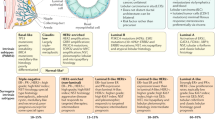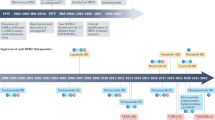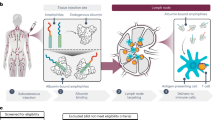Abstract
Background
Long-term response to HER2-targeted therapies is infrequent in metastatic breast cancer (MBC). We evaluated clinical characteristics of HER2-positive MBC patients with no evidence of disease (NED) vs residual disease (RES) experiencing long-term response to first-line HER2-targeted therapy.
Methods
Patients receiving first-line chemotherapy-trastuzumab (CT) or taxane-trastuzumab-pertuzumab (THP) with response duration ≥2-fold higher than in phase II/III trials (CT [18.2 months]; THP [40.4 months]) were included. Clinical characteristics and radiographic review for NED or RES was evaluated by Cox-regression (hazard ratio; HR) or Kaplan–Meier (log-rank). Characteristics associated with NED were evaluated by logistic regression (Odds; OR).
Results
From 01/2005-01/2016, N = 103 (4.6%) patients were identified. In multivariate analyses, NED (N = 46) showed improved progression-free (PFS) and overall survival (OS) [p < 0.001] versus RES (N = 57), with high 5-year PFS/OS for NED (93.2%/97.4%) relative to RES (10.6%/61.3%). Premenopausal status (p = 0.006), de-novo metastases (p = 0.002), and no palliative radiotherapy (p = 0.01) were associated with NED. Overall, 6/7 (85.7%) patients with NED were alive and disease-free after discontinuing HER2 treatment (≥1 year) versus 1/17 (5.9%) with RES.
Conclusions
Long-term responders with NED have better survival compared to RES. Premenopausal status and de novo metastatic disease are associated with NED. Prospective studies of HER2 therapy discontinuation with NED in MBC are warranted.
This is a preview of subscription content, access via your institution
Access options
Subscribe to this journal
Receive 24 print issues and online access
$259.00 per year
only $10.79 per issue
Buy this article
- Purchase on Springer Link
- Instant access to full article PDF
Prices may be subject to local taxes which are calculated during checkout



Similar content being viewed by others
Data availability
The data that support the findings of this study are available upon request from the corresponding author. The data are not publicly available due to privacy and ethical restrictions.
References
Cameron D, Piccart-Gebhart MJ, Gelber RD, Procter M, Goldhirsch A, de Azambuja E, et al. 11 years’ follow-up of trastuzumab after adjuvant chemotherapy in HER2-positive early breast cancer: final analysis of the HERceptin Adjuvant (HERA) trial. Lancet. 2017;389:1195–205. https://doi.org/10.1016/S0140-6736(16)32616-2.
Perez EA, Romond EH, Suman VJ, Jeong JH, Sledge G, Geyer CE, et al. Trastuzumab plus adjuvant chemotherapy for human epidermal growth factor receptor 2–positive breast cancer: planned joint analysis of overall survival from NSABP B-31 and NCCTG N9831. J Clin Oncol. 2014;32:3744–52. https://doi.org/10.1200/JCO.2014.55.5730.
Swain SM, Baselga J, Kim SB, Ro J, Semiglazov V, Campone M, et al. Pertuzumab, trastuzumab, and docetaxel in HER2-positive metastatic breast cancer. N. Engl J Med. 2015;372:724–34. https://doi.org/10.1056/NEJMoa1413513.
Murthy RK, Loi S, Okines A, Paplomata E, Hamilton E, Hurvitz SA, et al. Tucatinib, trastuzumab, and capecitabine for HER2-Positive Metastatic Breast Cancer. N Engl J Med. 2019; https://doi.org/10.1056/nejmoa1914609.
Saura C, Oliveira M, Feng YH, Dai MS, Chen SW, Hurvitz SA, et al. Neratinib plus capecitabine versus lapatinib plus capecitabine in HER2-positive metastatic breast cancer previously treated with ≥ 2 HER2-directed regimens: phase III NALA trial. J Clin Oncol: Off J Am Soc Clin Oncol. 2020;38:3138–49. https://doi.org/10.1200/JCO.20.00147.
Modi S, Saura C, Yamashita T, Park YH, Kim SB, Tamura K, et al. Trastuzumab deruxtecan in previously treated HER2-positive breast cancer. N. Engl J Med. 2020;382:610–21. https://doi.org/10.1056/NEJMoa1914510.
Swain SM, Miles D, Kim SB, Im YH, Im SA, Semiglazov V, et al. End-of-study analysis from the phase III, randomized, double-blind, placebo (Pla)-controlled CLEOPATRA study of first-line (1L) pertuzumab (P), trastuzumab (H), and docetaxel (D) in patients (pts) with HER2-positive metastatic breast cancer (MBC). J Clin Oncol. 2019;37:1020–1020. https://doi.org/10.1200/JCO.2019.37.15_suppl.1020.
Banerji U, van Herpen CML, Saura C, Thistlethwaite F, Lord S, Moreno V, et al. Trastuzumab duocarmazine in locally advanced and metastatic solid tumours and HER2-expressing breast cancer: a phase 1 dose-escalation and dose-expansion study. Lancet Oncol. 2019;20:1124–35. https://doi.org/10.1016/S1470-2045(19)30328-6.
Butterbaugh ST, Patel R, Romond EH, Mathew A. Trastuzumab use in patients with durable complete response in HER2-amplified metastatic breast cancer: to continue or not to continue. Ann Oncol. 2017;28:3098–9. https://doi.org/10.1093/annonc/mdx532.
Wong Y, Raghavendra AS, Hatzis C, Irizarry JP, Vega T, Horowitz N, et al. Long‐term survival of de novo stage IV human epidermal growth receptor 2 (HER2) positive breast cancers treated with HER2‐targeted therapy. Oncologist. 2019;24:313–8. https://doi.org/10.1634/theoncologist.2018-0213.
Cortés J, Kim SB, Chung WP, Im SA, Park YH, Hegg R, et al. LBA1 Trastuzumab deruxtecan (T-DXd) vs trastuzumab emtansine (T-DM1) in patients (Pts) with HER2+ metastatic breast cancer (mBC): Results of the randomized phase III DESTINY-Breast03 study. Ann Oncol. 2021;32. https://doi.org/10.1016/j.annonc.2021.08.2087.
Datta J, Fracol M, McMillan MT, Berk E, Xu S, Goodman N, et al. Association of depressed anti-HER2 T-helper type 1 response with recurrence in patients with completely treated HER2-positive breast cancer: role for immune monitoring. JAMA Oncol. 2016;2:242–6. https://doi.org/10.1001/jamaoncol.2015.5482.
Datta J, Berk E, Xu S, Fitzpatrick E, Rosemblit C, Lowenfeld L, et al. Anti-HER2 CD4+ T-helper type 1 response is a novel immune correlate to pathologic response following neoadjuvant therapy in HER2-positive breast cancer. Breast Cancer Res. 2015;17:71 https://doi.org/10.1186/s13058-015-0584-1.
Griguolo G, Pascual T, Dieci MV, Guarneri V, Prat A. Interaction of host immunity with HER2-targeted treatment and tumor heterogeneity in HER2-positive breast cancer. J Immunother Cancer. 2019;7:90 https://doi.org/10.1186/s40425-019-0548-6.
Loi S, Giobbie-Hurder A, Gombos A, Bachelot T, Hui R, Curigliano G, et al. Pembrolizumab plus trastuzumab in trastuzumab-resistant, advanced, HER2-positive breast cancer (PANACEA): a single-arm, multicentre, phase 1b-2 trial. Lancet Oncol. 2019;20:371–82. https://doi.org/10.1016/S1470-2045(18)30812-X.
Emens LA, Esteva FJ, Beresford M, Saura C, De Laurentiis M, Kim SB, et al. Trastuzumab emtansine plus atezolizumab versus trastuzumab emtansine plus placebo in previously treated, HER2-positive advanced breast cancer (KATE2): a phase 2, multicentre, randomised, double-blind trial. Lancet Oncol. 2020;21:1283–95. https://doi.org/10.1016/S1470-2045(20)30465-4.
Witzel I, Müller V, Abenhardt W, Kaufmann M, Schoenegg W, Schneeweis A, et al. Long-term tumor remission under trastuzumab treatment for HER2 positive metastatic breast cancer—results from the HER-OS patient registry. BMC Cancer. 2014;14:806 https://doi.org/10.1186/1471-2407-14-806.
Yardley DA, Tripathy D, Brufsky AM, Rugo HS, Kaufman PA, Mayer M, et al. Long-term survivor characteristics in HER2-positive metastatic breast cancer from registHER. Br J Cancer. 2014;110:2756–64. https://doi.org/10.1038/bjc.2014.174.
Moilanen T, Mustanoja S, Karihtala P, Koivunen JP. Retrospective analysis of HER2 therapy interruption in patients responding to the treatment in metastatic HER2+ breast cancer. ESMO Open. 2017;2:e000202 https://doi.org/10.1136/esmoopen-2017-000202.
Gullo G, Zuradelli M, Sclafani F, Santoro A, Crown J. Durable complete response following chemotherapy and trastuzumab for metastatic HER2-positive breast cancer. Ann Oncol. 2012;23:2204–5. https://doi.org/10.1093/annonc/mds221.
Niikura N, Shimomura A, Fukatsu Y, Sawaki M, Ogiya R, Yasojima H, et al. Durable complete response in HER2-positive breast cancer: a multicenter retrospective analysis. Breast Cancer Res Treat. 2018;167:81–87. https://doi.org/10.1007/s10549-017-4489-9.
Hyman DM, Piha-Paul SA, Won H, Rodon J, Saura C, Shapiro GI, et al. HER kinase inhibition in patients with HER2- and HER3-mutant cancers. Nature. 2018;554:189–94. https://doi.org/10.1038/nature25475.
Altundag K. Duration of trastuzumab in HER2-positive metastatic breast cancer after complete remission: still debatable issue? Breast Cancer Res Treat. 2018;167:815–815. https://doi.org/10.1007/s10549-017-4536-6.
Viel E, Arbion F, Barbe C, Bougnoux P. Prolonged complete response after treatment withdrawal in HER2-overexpressed, hormone receptor-negative breast cancer with liver metastases: the prospect of disappearance of an incurable disease. BMC Cancer. 2014;14:690 https://doi.org/10.1186/1471-2407-14-690.
Lambertini M, Vaz-Luis I. Is HER2-positive metastatic breast cancer still an incurable disease? Lancet Oncol. 2020;21:471–2. https://doi.org/10.1016/S1470-2045(20)30058-9.
Verma S, Miles D, Gianni L, Krop IE, Welslau M, Baselga J, et al. Trastuzumab emtansine for HER2-positive advanced breast cancer. N. Engl J Med. 2012;367:1783–91. https://doi.org/10.1056/NEJMoa1209124.
Chan A, Martin M, Untch M, Gil MG, Guillem-Porta V, Wojtukiewicz M, et al. Vinorelbine plus trastuzumab combination as first-line therapy for HER 2-positive metastatic breast cancer patients: an international phase II trial. Br J Cancer. 2006;95:788–93. https://doi.org/10.1038/sj.bjc.6603351.
Urruticoechea A, Rizwanullah M, Im SA, Ruiz ACS, Láng I, Tomasello G, et al. Randomized phase III trial of trastuzumab plus capecitabine with or without pertuzumab in patients with human epidermal growth factor receptor 2–positive metastatic breast cancer who experienced disease progression during or after trastuzumab-based therap. J Clin Oncol. 2017;35:3030–8. https://doi.org/10.1200/JCO.2016.70.6267.
Schaller G, Fuchs I, Gonsch T, Weber J, Kleine-Tebbe A, Klare P, et al. Phase II study of capecitabine plus trastuzumab in human epidermal growth factor receptor 2–overexpressing metastatic breast cancer pretreated with anthracyclines or taxanes. J Clin Oncol. 2007;25:3246–50. https://doi.org/10.1200/JCO.2006.09.6826.
Murthy P, Kidwell KM, Schott AF, Merajver SD, Griggs JJ, Smerage JD, Van Poznak CH, Wicha MS, Hayes DF, Henry NL. Clinical predictors of long-term survival in HER2-positive metastatic breast cancer. Breast cancer Res Treat. 2016;155:589–95. https://doi.org/10.1007/s10549-016-3705-3.
Printz C. NCI launches exceptional responders initiative: researchers will attempt to identify why some patients respond to treatment so much better than others. Cancer. 2015;121:803–4. https://doi.org/10.1002/cncr.29311.
Cescon DW, Bratman SV, Chan SM, Siu LL. Circulating tumor DNA and liquid biopsy in oncology. Nat Cancer. 2020;1:276–90. https://doi.org/10.1038/s43018-020-0043-5.
Magbanua MJM, Swigart LB, Wu HT, Hirst GL, Yau C, Wolf DM, et al. Circulating tumor DNA in neoadjuvant-treated breast cancer reflects response and survival. Ann Oncol. 2021;32:229–39. https://doi.org/10.1016/j.annonc.2020.11.007.
Tokudome N, Hayes DF. Analysis of circulating tumor DNA to monitor metastatic breast cancer. Breast Dis: A Year Book Q. 2013;24:350–2. https://doi.org/10.1016/j.breastdis.2013.10.034.
Guan X, Liu B, Niu Y, Dong X, Zhu X, Li C, et al. Longitudinal HER2 amplification tracked in circulating tumor DNA for therapeutic effect monitoring and prognostic evaluation in patients with breast cancer. Breast. 2020;49:261–6. https://doi.org/10.1016/j.breast.2019.12.010.
Ma F, Zhu W, Guan Y, Yang L, Xia X, Chen S, et al. ctDNA dynamics: a novel indicator to track resistance in metastatic breast cancer treated with anti-HER2 therapy. Oncotarget. 2016;7:66020–31. https://doi.org/10.18632/oncotarget.11791.
Gradishar WJ, Anderson BO, Abraham J, Aft R, Agnese D, Allison KH, et al. Breast cancer, version 3.2020, NCCN Clinical practice guidelines in oncology. J Natl Compr Canc Netw. 2020;18. https://doi.org/10.6004/jnccn.2020.0016.
Perez EA, Cortés J, Gonzalez-Angulo AM, Bartlett JMS. HER2 testing: current status and future directions. Cancer Treat Rev. 2014;40:276–84. https://doi.org/10.1016/j.ctrv.2013.09.001.
Acknowledgements
Princess Margaret Cancer Centre and Cancer Care Alberta would like to acknowledge the patients and families for their contribution to this research. This study was presented at the American Society of Clinical Oncology (ASCO) annual meeting in Chicago, USA, in June 2019.
Funding
No funding was procured for this study.
Author information
Authors and Affiliations
Contributions
Conceptualisation—ZWV, PAT, DR, KK, SL and DC. Data curation—ZWV, SL, KK and DR. Formal analyses—ZWV and DT. Funding acquisition—None. Investigation—ZWV and DR, Methodology—ZWV, PAT and SL. Project administration—ZWV, DWC and PLB. Resources—ZWV, DT and DWC. Software—ZWV and DT. Supervision—SL and DWC. Validation—Not applicable. Visualisation—ZWV. Writing—Original draft—ZWV. Writing—Review and editing—ZWV, DR, DT, PAT, KK, PLB, SL and DWC.
Corresponding author
Ethics declarations
Ethics approval and consent to participate
This study was approved by the Princess Margaret Cancer Centre Research Ethics Board (NCT03740503) and the Health and Research Ethics Board of Alberta (Cancer Committee).
Consent to publish
Not applicable.
Competing interests
ZWV has received honoraria from Pfizer, Exact Sciences, Knight Pharmaceuticals, and Novartis. DWC reports consultancy and advisory fees from AstraZeneca, Exact Sciences, Gilead, GlaxoSmithKline, Merck, Novartis, Pfizer, and Roche; research funding to their institution from GlaxoSmithKline, Inivata, Merck, Pfizer and Roche; is a member of a trial steering committee for Merck; and holds a patent (US62/675,228) for methods of treating cancers characterised by a high expression level of spindle and kinetochore associated complex subunit 3 (ska3) gene. PLB has received research funding from Bristol-Myers Squibb, Sanofi, AstraZeneca, Genentech/Roche, SERVIER, GlaxoSmithKline, Novartis, SignalChem, PTC Therapeutics, Nektar, Merck, Seattle Genetics, Mersana, Immunomedics, Eli-Lilly, Zymeworks, and VelosBio. Uncompensated advisory for Lilly, Seagen, Merck, Genentech/Roche, Bristol-Myers Squibb, and Gilead. PAT has honoraria from Teva, Eisai, Pfizer, Novartis, Bristol-Myers Squibb, Merck, AstraZeneca and Roche. No conflicts of interest: The following authors have declared no conflicts of interest: DR, DT, KK and SL.
Additional information
Publisher’s note Springer Nature remains neutral with regard to jurisdictional claims in published maps and institutional affiliations.
Supplementary information
Rights and permissions
About this article
Cite this article
Veitch, Z., Ribnikar, D., Tilley, D. et al. No evidence of disease versus residual disease in long-term responders to first-line HER2-targeted therapy for metastatic breast cancer. Br J Cancer 126, 881–888 (2022). https://doi.org/10.1038/s41416-021-01676-4
Received:
Revised:
Accepted:
Published:
Issue Date:
DOI: https://doi.org/10.1038/s41416-021-01676-4
This article is cited by
-
Management of patients with advanced-stage HER2-positive breast cancer: current evidence and future perspectives
Nature Reviews Clinical Oncology (2024)



